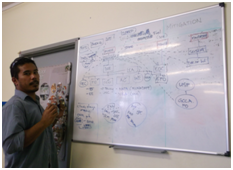The Government of Nauru submitted its Readiness Request of USD 300,00, and Institutional Gap Analysis for the Green Climate Fund Readiness Support on 30 March 2016. The technical assistance was provided by the Pacific Island Forum Secretariat (PIFS) through the deployment of its Climate Finance Adviser, Mr Exsley Taloiburi, as part of the CROP agencies collaborative efforts to efficiently serve the priority needs of Pacific island countries in relation to climate change adaptation and mitigation.
Financed by the Rapid Response Fund under the Regional Technical Support Mechanism (RTSM), this technical assistance brings a total of USD170,000 in financial assistance in the area of climate change that the RTSM has provided through SPREP to its member countries.
PIFS is a member of the Working Arm of the CROP Executive Subcommittee on Climate Change and Disaster Resilient Development who is responsible for coordination oversight, guidance and monitoring of the RTSM.
The one month work involved building the capacity of Nauru’s GCF National Designated Authority to fulfil its functions and expected responsibilities; defining its Strategic Framework for engagement with the Fund; and taking measures to meet fiduciary standards and environment and social safeguard requirements to access resources from the Fund. SPREP was the delivery partner for this Readiness Request.
The joint effort between SPREP, PIFS and the Government of Nauru ensured a smooth and rapid process in the development and submission of Nauru’s GCF Readiness request.
Mr Exsley acknowledged the support of the RTSM team and the Government of Nauru stating PIFS “remained committed to any further support to Nauru in climate change finance and also to progress the work of the RTSM in other Pacific island countries.”
 Mr Nodel Neneiya, SIS Officer, Nauru Department of Foreign Affairs Mapping out Nauru’s current climate change institutional structure in preparation of the Institutional Gap Analysis for the GCF Readiness Support
Mr Nodel Neneiya, SIS Officer, Nauru Department of Foreign Affairs Mapping out Nauru’s current climate change institutional structure in preparation of the Institutional Gap Analysis for the GCF Readiness Support
Source: Exsley Taloiburi, PIFS Climate Change Finance Adviser; RTSM CROP Expert
Financing for RTSM was first drawn down in March 2015 and within one year seven experts were deployed into the region. Federated States of Micronesia, Tonga and Vanuatu received supports from two experts each with one expert providing support to Nauru. The Technical expertise provided was across the range of Project Design, Monitoring & Evaluation, Meteorology & Climate Science, Climate Financing, Coastal Management, Environment Impact Assessment, and IT-Drupal.
The RTSM focuses specifically on food security and infrastructure issues that are related to climate change and its impacts. Given recent natural disasters impacting on Vanuatu’s environment and socio-economic growth, the RTSM deployed a climate scientist from NIWA to develop the Vanuatu Framework on Climate Services (VFCS).
Findings and recommendations of the VFCS will be used to develop a Climate Roadmap; a long-term instructional document, which will provide guidance for the Vanuatu Climate Division on required human resources and training needs.
Both the VFCS and Climate Roadmap will shape long-term planning for the Vanuatu Meteorology and Geo-Hazards Department (VMGD) through giving phased time-frames for the introduction of new and necessary climatic products and services, increasing? the capability of the National Advisory Board Portal to manage and share knowledge on meteorological and climatic services and information.
The VFCS and Climate Roadmap will also allow the VMGD to provide guided climate services to different sectors including agriculture, food security, health, water, energy, disaster risk reduction, tourism, fisheries and most importantly, the affected communities.

Photo1: Marine biologist, Poasi Ngaluafe, surveying site by observing approximately a 50m line to shore

Photo2: Survey team: Taniela Kula, Feauni and Poasi Ngaluafe. Both photos taken by RTSM National Team Leader, Mr Fuka Kitekei’aho (not shown in photo)
Assistance was also provided to the Government of Tonga through the deployment of a Coastal Management Specialist and an EIA to undertake a Diagnostic Survey and an EIA for Vava’u, to inform the development of a Strategic Policy Framework for Integrated Zone Management Plan and a Project Proposal, to enhance the Resilience of the Communities of Vava'u to climate change impacts. Lessons learnt from the Lifuka/Pangai, Ha’apai EIA undertaken in 2014 and other EIA studies employed by Tonga informed the work of both experts.
The next lot of RTSM technical assistance for member countries include Fiji’s Technology Needs Assessment for the United Nations Framework Convention on Climate Change, Republic of Marshall Islands Agroforestry project, planned to be undertaken in partnership with SPC, and Palau’s Alternative Water Supply Project which may also be implemented in partnership with other regional organisations and, or development partners. Other eligible Pacific island countries are encouraged to apply to the RTSM ([email protected]) or http://rtsm.pacificclimatechange.net/Request-Assistance for technical assistance.
Over USD 600,000 is available to assist eligible Pacific island countries until June 2017.
The RTSM is a regional mechanism hosted and administered by SPREP. Funded by the Asian Development Bank (ADB), the RTSM and RRF is a collaborative undertaking of all CROP agencies and their associated development partners and donors. Its work is guided by the Working Arm of the CROP Executive Subcommittee on Climate Change and Disaster Resilient Development (WARD) who reports directly to CROP Heads on RTSM’s progress in responding to urgent climate change needs of the 14 eligible Pacific island countries.
For further information contact the RTSM Coordinator, Satui Bentin ([email protected]).

